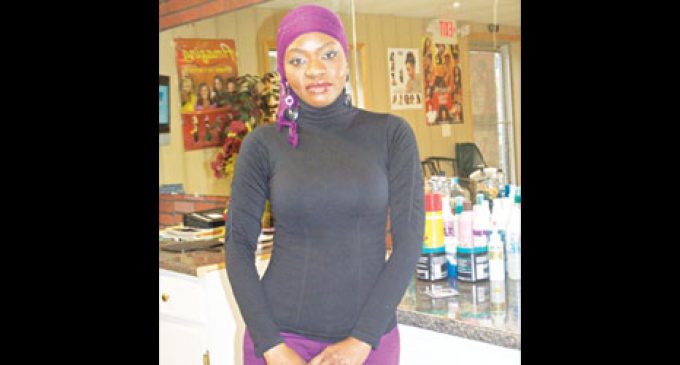Hair braiders fighting licensure requirement

African hair braiders here and across the state are hoping the General Assembly will amend its impending licensure requirements for braiders.
State Sen. Earline Parmon and then-Rep. Larry Womble sponsored a bill in 2010 that would require braiders to obtain licenses from the state in order to continue practicing their craft. State law requires that hair stylists and barbers obtain licenses in order to practice. Licenses are awarded only after proper training and testing. Braiders use natural or synthetic and have minimal contact with clients’ actual hair; therefore, they had been excluded from the requirement.
Parmon, who was a member of the House of Representatives at the time, said the bill stemmed from reports she had received that some braiders were using chemicals and concerns over safety and sanitation standards in some unregulated shops.
“The whole point of the bill originally was to regulate them for public health concerns and those kinds of issues,” she explained. “…The whole intent was to ensure that people that sought the services of hair braiders were protected the same as the people that go to cosmetologists.”
The bill had unintended consequences, Parmon said. Braiders, many of whom are immigrants from African nations, responded with a backlash of criticism, saying the bill unfairly handicapped their businesses by asking them to adhere to requirements many of them could not meet because of language barriers. The cosmetology exam required for licensure is not offered in French – the native language of braiders from Senegal and other West African nations.
“Their English is very poor,” reported Adama Ceesay, one of the founders of the African Hair Braiding Association of North Carolina, which represents more than 450 braiders statewide. “They cannot communicate verbally so there’s no way they will pass (the test) … This is their only way to make a living, so if this is shut down (because they aren’t licensed), there will be people who will lose their livelihood.”
Braiders also complained that the cosmetology courses needed to pass the exam were not offered frequently enough to meet their needs.
“There’s always a problem when licensure is created with a short period of time for individuals to take an exam, and when they’ve never had any formal training or education, it is a barrier for some people,” said Lynda Elliott, executive director of the North Carolina Board of Cosmetic Art Examiners, which will oversee the licensing. “The Board has no desire to put thousands of people out of work or out of business.” But Elliott, who spent two decades on the New Hampshire Board of Barbering Cosmetology & Esthetics, believes braiders should be regulated in order to protect the public from communicable diseases that can be spread if proper sanitation and disinfection techniques are not used, in addition to unsafe practices such as excessive tension in the braiding process that she said can cause baldness.
“Whenever there’s a service that is provided that is skin to skin contact from one individual to another, absolutely there needs to be some kind of licensure so we can be sure that the individual is protected,” she said. “We feel like there could be thousands of individuals that may be out there working, but currently, we have about 450 individuals that have taken their exam and obtained their licensure. If we can get everyone licensed … then the protections are going to be there.”
The General Assembly extended the deadline for braiders to obtain licenses from July 2010 to July 2015. Elliott thinks the whole bill needs to be given another look.
“Honestly, the extensions aren’t solving the problem, either,” said Elliott, a licensed cosmetologist and barber. “We will do whatever the legislative body feels needs to be done. We will enforce these legislations, but we think that this is something that needs to be looked at more.”
The language barrier remains an ongoing issue. Braiders have called for the legislature to institute a grandfather clause, which would allow all those who were practicing two years or more prior to the bill’s passage to continue to do so without a license, attaching the license requirements only to new businesses and those that were started after the bill was passed. Ceesay says the clause is the only way to preserve the solvency of the hundreds of businesses his organization represents. If the clause is not implemented, Ceesay speculated that many braiders would go underground and continue operating their businesses illegally.
Parmon said last week that she would support the grandfather clause, however she was uncertain whether it will be something she can tackle this session with so many other pressing issues demanding her attention.
“I support that because these people have been here and it’s just like with other immigrants that we’re talking about – they should have an opportunity to work,” she stated. “…We weren’t trying to put people out of business.”
Dakar, Senegal native Amy Seck says she would like to see the licensing requirements lifted altogether. Seck, a mother of five and owner of Amy’s African Hair Braiding on Patterson Avenue, said she didn’t think the exam would be a problem for her, but she knows firsthand how hard it would hit the African braiding community, including her niece, Sally Sow, who works in her shop and speaks Wolof, a native language also spoken by many Senegalese.
“I don’t want them to ask about the license for the braiders. It’s not going to be easy for us to get the license. It’s not going to be easy at all because a lot of people didn’t (go) to school – they cannot read,” related Seck, who has been in business for 13 years. “We can do our job well, but for the licensure, it’s not going to be easy.”











